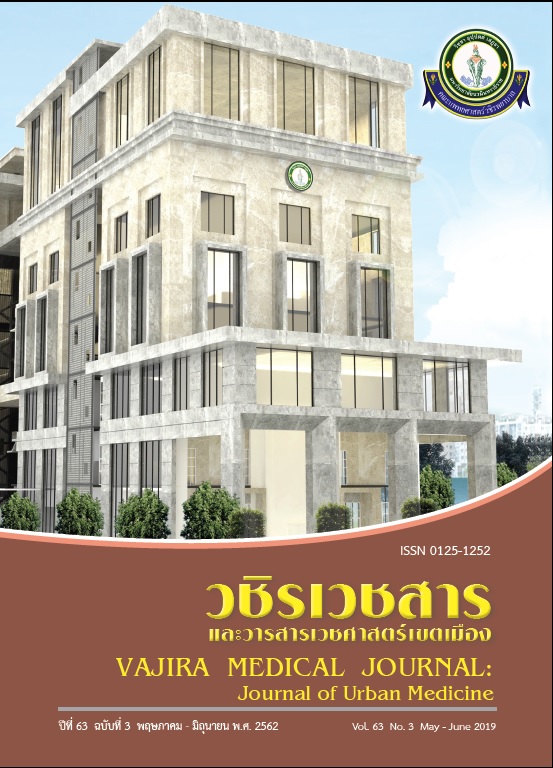The Evaluation of Training Program of Nursing Specialty in Family Nursing Practitioner: A study in Boromarajonani College of Nursing Sanpasithiprasong
Main Article Content
Abstract
Objective: To evaluate the performance of the 1st training program of nursing specialty in family nursing practitioner provided by Boromarajonani College of Nursing, Sanpasithiprasong
Methods: This study was a project evaluation. The CIPP Evaluation Model was used in the study. CIPP model comprises of 4 factors; context, input, process and product. The sample were family nurse practitioners (n=50), family nurse practitioners’ directors (n=50), family nurse practitioners’ colleagues (n=50), clients (n=50), and curriculum coordinators (n=9). Research tools were pre-post-test, questionnaire, and focus groups. Descriptive statistic and content analysis were used to analyze data..
Results: The study showed that context factors, foundation and rationale, objectives, and program plan of the 1st training program of nursing specialty in family nursing practitioner were appropriated. Input factors; such as lecturer, curriculum coordinators, instructors, materials, time, place, public relations, and budget were appropriated. Process factors; such as planning, program activities and program evaluation were suitable with the curriculum aims. No problems and obstacles were found in program accessibility. Product factors; 1) The aims of the curriculum were achieved 2) the curriculum was in line with primary health care policy 3) Post-test had higher mean scores than pre-test 4) The mean scores of nurse practitioners’ competency ( = 4.48, SD = .50), family nurse practitioners’ directors (
= 4.60, SD =. 62), family nurse practitioners’ colleagues (
= 4.56, SD = .49) and the clients (
= 4.30, SD = .38) was in a good level 5) The curriculum coordinators agreed that further training program should be improved taking all comments from nurse practitioners who attended the previous training program into account.
Conclusion: The result of this study can be beneficial for curriculum coordinators to develop a training program for family nurse practitioner. The training program used in this study increases a special competency for family nurse practitioners being able to practice in a primary medical care service and family health management.
Downloads
Article Details
References
2. The Prime Minister. Summary of National Economic and Social Development Plan (The 12th Edition 2017-2026). Available from: http://www.nesdb.go.th/download/plan.pdf. Retrieved November 20, 2018.
3. Jongudomkarn D. Family Health Nursing: Theory and application for families with crisis situations. Nonthaburi: Beyond Enterprise CO; 2015.
4. Wiboonsri R. Project Evaluation: Concepts and Practices. 8th ed. Bangkok: Chulalongkorn University Printing House; 2013.
5. Buasonte R. Integrative approach for research and evaluation. Bangkok: Chulalongkorn University Printing House; 2012.
6. Srisatidnarakul B. The methodology in nursing research. 5th ed. Bangkok: You and I Intermedia Partnership; 2010.
7. Sawangdee Y. Content Analysis. The Institute for Population and Social Research, Mahidol University. Avaliable from: www.spu.ac.th/research/files/pdf. Retrieved November 22, 2018.
8. Boromarajonani College of Nursing Chakriraj. Training Program of Nursing Specialty in Family Nursing Practitioner. Avaliable from: http://www.ckr.ac.th/.Retrieved November 24, 2018.
9. Thailand Nursing and Midwifery Council. Thailand Nursing and Midwifery, Announcement : Criteria for the Preparation of Specialized Nursing Training Programs. Avaliable from: https://www.tnmc.or.th/news/. Retrieved November 24, 2018.
10. Ministry of Public Health. Guidelines of Primary care cluster for Care Unit. [Internet]. 2016 [cited 2018 Nov 25] Avaliable from: http://bps.moph.go.th/new_bps/sites/default/files/Guidelines%20PCC.pdf.
11. Boromarajonani College of Nursing Sanpasithiprasong. Action plan for financial year 2018. Strategy and Quality assurance Division; 2018.
12. Apichutboonchock, S. Evaluation of Nutrition Project for Nutrition Education Enhancement among Baccalaureate Nursing Students in Boromarajonani College, Sanpasithiprasong. Vajira Med J 2015; 59(1): 47-57.
13. Intarasorn P, Laohasiriwong W. Evaluation of Health Behavior Modification Village to Reduce Cancer, Hypertension, Cardiovascular Disease in Chaiyaphum Province for the 57th Anniversary Commemoration Maha Wachiralongkorn Project: A Case Study of Ban Lad Tai . KKU Res J (GS) 2012; 12 (2): 30-41.
14. Apichutboonchock S. The development of a case study learning model for developing student nurses’ competency in respiratory assessment in a newborn intensive care unit. Vajira Med J 2015; 59(3):25-34.


